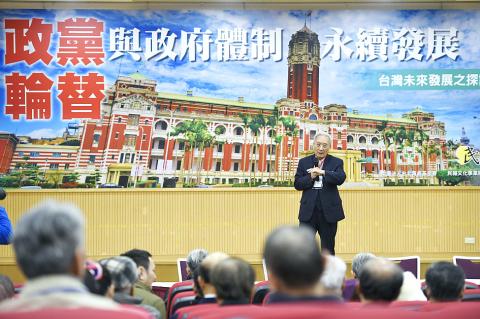Having won the presidential election and achieved its first ever absolute majority in the Legislative Yuan, the Democratic Progressive Party (DPP) should seek to utilize its administrative and legislative resources to implement transitional justice and deepen the nation’s democratic system, Foundation for Asia-Pacific Development president Kang Ning-hsiang (康寧祥) said at a forum the foundation held in Taipei yesterday.
Academics also called on the DPP to prioritize the effort to deal with the issue of the Chinese Nationalist Party’s (KMT) assets and establish a protocol for the transfer of power between different parties.
Without a democratic system, the good life would disappear, Kang said at the forum, which was held to discuss issues relating to sustainable development of governmental systems following the transfer of power.

Photo: George Tsorng, Taipei Times
The nation’s lack of economic success in recent years was the result of the overtly China-friendly policies of the KMT government under President Ma Ying-jeou (馬英九), Kang said, adding that while some Taiwanese have made money, they are now paying the price for the economy being too reliant on China.
President-elect Tsai Ing-wen (蔡英文) must prioritize the KMT’s party asset issue, “which is a national concern as it involves Japanese-colonial era assets, and implement full-fledged transitional justice,” National Taipei University (NTU) Department of Public Administration and Policy professor Chen Yaw-shyang (陳耀祥) said.
Chen cited Germany as an example of successful transitional justice policies, saying that over the past 15 years, Germany has processed all the controversial events that took place in former East Germany, adding that the resolution of such issues is necessary to deepen democracy in Taiwan.
The Legislative Yuan needs to be more transparent and open with its procedures and release of information to prevent the abuse of power and governmental corruption, Chen said, adding that governmental committees should be open for citizens to attend and a special broadcast service to view ongoing meetings at the legislature should be implemented.
“As opposed to the Ma administration’s opaque negotiations, the [new] government must pass a cross-strait accords oversight act so governmental dealings with China are entirely transparent,” Chen said.
Identifying with China is like a recurring rash on a body that is weak and the DPP should make identification with Taiwan a priority, National Dong Hwa University College of Indigenous Studies professor Shih Cheng-feng (施正峰) said.
Taiwan Brain Trust member Lee Ming-chun (李明峻) said the DPP must institute a legal process for the turning over of power between political parties.
Lee pointed to the US’ Presidential Transition Act as an example, which allocates several million US dollars to be used by the outgoing president and the president-elect to facilitate the handover process, adding that in France, once the new president is proclaimed, the handover must occur within 10 days.
The French government sees the handover of nuclear launch codes as the signifier that presidential authority has been passed to the next administration, Lee said, adding that Taiwan should also formulate some legal basis for the transition of power.

CHAOS: Iranians took to the streets playing celebratory music after reports of Khamenei’s death on Saturday, while mourners also gathered in Tehran yesterday Iranian Supreme Leader Ayatollah Ali Khamenei was killed in a major attack on Iran launched by Israel and the US, throwing the future of the Islamic republic into doubt and raising the risk of regional instability. Iranian state television and the state-run IRNA news agency announced the 86-year-old’s death early yesterday. US President Donald Trump said it gave Iranians their “greatest chance” to “take back” their country. The announcements came after a joint US and Israeli aerial bombardment that targeted Iranian military and governmental sites. Trump said the “heavy and pinpoint bombing” would continue through the week or as long

TRUST: The KMT said it respected the US’ timing and considerations, and hoped it would continue to honor its commitments to helping Taiwan bolster its defenses and deterrence US President Donald Trump is delaying a multibillion-dollar arms sale to Taiwan to ensure his visit to Beijing is successful, a New York Times report said. The weapons sales package has stalled in the US Department of State, the report said, citing US officials it did not identify. The White House has told agencies not to push forward ahead of Trump’s meeting with Chinese President Xi Jinping (習近平), it said. The two last month held a phone call to discuss trade and geopolitical flashpoints ahead of the summit. Xi raised the Taiwan issue and urged the US to handle arms sales to

BIG SPENDERS: Foreign investors bought the most Taiwan equities since 2005, signaling confidence that an AI boom would continue to benefit chipmakers Taiwan Semiconductor Manufacturing Co’s (TSMC, 台積電) market capitalization swelled to US$2 trillion for the first time following a 4.25 percent rally in its American depositary receipts (ADR) overnight, putting the world’s biggest contract chipmaker sixth on the list of the world’s biggest companies by market capitalization, just behind Amazon.com Inc. The site CompaniesMarketcap.com ranked TSMC ahead of Saudi Aramco and Meta Platforms Inc. The Taiwanese company’s ADRs on Tuesday surged to US$385.75 on the New York Stock Exchange, as strong demand for artificial intelligence (AI) applications led to chip supply constraints and boost revenue growth to record-breaking levels. Each TSMC ADR represents

State-run CPC Corp, Taiwan (CPC, 台灣中油) yesterday said that it had confirmed on Saturday night with its liquefied natural gas (LNG) and crude oil suppliers that shipments are proceeding as scheduled and that domestic supplies remain unaffected. The CPC yesterday announced the gasoline and diesel prices will rise by NT$0.2 and NT$0.4 per liter, respectively, starting Monday, citing Middle East tensions and blizzards in the eastern United States. CPC also iterated it has been reducing the proportion of crude oil imports from the Middle East and diversifying its supply sources in the past few years in response to geopolitical risks, expanding